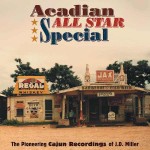The overwhelming success of Harry Choates’ immortal “Jole Blon” in 1946 resulted in national notoriety and evolution into a country staple of sorts and the genesis of J.D. Miller’s record empire. Though the Crowley businessman probably wasn’t interested in how many units the Choates hit moved per se, what did pique his interest was the potential market for regional French music at a time when such recordings were difficult to obtain. As a result of Choates’ national breakthrough, Miller tapped a lucrative market that also enabled him to wax father-in-law Lee Sonnier in addition to his ever-growing stable of artists.
This three-disc, 78-track Bear Family collection focuses on Miller’s Cajun and Cajun/country sides recorded between 1946-1956, with four more sides from 1959 (for various reasons, Miller didn’t record any Cajun music in ‘57 and ‘58). Other than previously released bits and pieces, most of this has never been reissued domestically on CD, and wouldn’t have been possible without the preservationist efforts of record collectors Lyle Ferbrache and Dave Sax of California and New York, respectively. Between the pooling of both collections, nearly all of Miller’s Fais Do Do/Feature sides are found here, chronologically sequenced by record catalog number.
Some of the earliest recordings of Austin Pitre and Aldus Roger are found here, while the names of forgotten artists Jimmy Choates, Louis Spell and Cleveland Mire surface again. Other than Happy [Fats], Doc [Guidry] and the Boys’ French folk selections “La Cravat” and “Gabriel Waltz,” the proceedings lean towards late ‘40s/ early ‘50s Hank Williams-influenced honky tonk, with many bands supplying a steel guitar ace in addition to accordion and fiddle. Chuck Guidry, Jimmy Newman and Abe Manuel clearly stand out in terms of topflight musicianship, as their futures would demonstrate. Newman moved to Nashville where he was successful, and Manuel toured behind Lefty Frizzell. Papa Cairo delivers an English and a French version of “Big Texas,” the precursor to Williams’ “Jambalaya,” with plinkety-plink pianos and buzz-cutting steel rides. The original “Diggy Liggly Lo” is also here from Terry Clement and His Rhythmic Five. As legend has it, younger brother Purvis repeatedly sang “diggy, diggly, diggy, do” to compensate for his lack of French, hence providing the inspiration for the song’s catch phrase title.
The sound quality is remarkable, and supplementing the collection is an 80-page, hardbound coffee table book complete with history, bios and vintage black & white photos. Price-wise, it may be a small investment, but the dividends are immediate.





